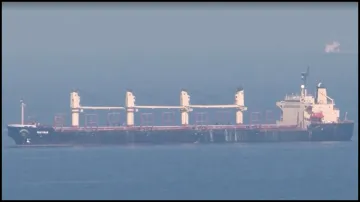Cargo ship at risk of sinking after 'catastrophic' attack by Houthis, crew forced to abandon vessel
At least two missiles struck the Belize-flagged ship named Rubymar in the Gulf of Aden on February 18, according to the US Military. The crew managed to evacuate and was picked up by another ship towards Djibouti, said LSS-SAPU, the security firm responsible for Rubymar.

Cairo: Yemen-based Houthi rebels on Monday said they attacked a Belize-flagged British-registered and Lebanese-managed cargo vessel in the Gulf of Aden which was at risk of sinking, further raising the stakes in their campaign to disrupt global shipping and stoking fears of an expansion of the ongoing Israel-Hamas war in Gaza. The Houthis launched missiles at the ship, prompting the crew to abandon it for safety.
Houthi military spokesperson Yahya Saree said in a statement that the Rubymar's crew was safe but that the ship was badly damaged and at risk of sinking, which would be a significant propaganda victory for Houthis if true. Saree also said the Houthis also shot down a US MQ-9 Reaper drone over the Yemeni port of Hodeidah.
"The ship suffered catastrophic damages and came to a complete halt. During the operation, we made sure that the ship’s crew exited safely," Saree said. The vessel was on its way to Bulgaria from Khorfakkan in the United Arab Emirates (UAE). There was no independent confirmation the vessel sank.
Additionally, the US military's Central Command (CENTCOM) confirmed that two anti-ship ballistic missiles were launched from Houthi-controlled areas of Yemen and targeted the Rubymar on February 18. "One of the missiles struck the vessel, causing damage. The ship issued a distress call and a coalition warship along with another merchant vessel responded to the call to assist the crew of the Rubymar," it said.
LSS-SAPU, the security firm of Rubymar, said the crew managed to evacuate after two missiles hit the vessel and were picked up by another commercial ship which took them to Djibouti. "We know she was taking in water. There is nobody on board now ... The owners and managers are considering options for towage," the firm told Reuters over the phone.
So far, no ships have been sunk nor crew killed from the attacks in a sea lane accounting for about 12 per cent of global maritime traffic. Some companies have chosen to go the longer and more expensive route via the southern tip of Africa. Despite Western attacks on them in Yemen, the Houthis have vowed to continue targeting ships linked to Israel until attacks on Palestinians in the Gaza Strip stop.
Meanwhile, the US military said it was conducting new airstrikes targeting the rebels, including one that targeted the first Houthi underwater drone seen since they began launching attacks on international shipping in November.
Greek-flagged vessel hit by Houthis
In a second incident within hours, the Greece-flagged, US-owned bulk carrier Sea Champion with 23 crew members was attacked twice on Monday by missiles, with a window damaged but no injuries to personnel, Greek shipping ministry sources said. The vessel was taking grain from Argentina to Aden.
Seafarers in the firing line have signed industry-wide agreements giving them rights to refuse to sail on ships passing through the Red Sea and to receive double pay when entering high-risk zones. Since the Houthis began their campaign in November after the Israel-Hamas war, international shipping remains disrupted.
Meanwhile, shipping industry associations on Monday called for the release of the 25 crew members of the Galaxy Leader commercial ship hijacked by the Houthis on November 19, who took them hostage. "The 25 seafarers who make up the crew of the Galaxy Leader are innocent victims of the ongoing aggression against world shipping. It is abhorrent that seafarers were seized by military forces and that they have been kept from their families and loved ones for too long," the associations said.
Major shipping lines have largely abandoned Red Sea shipping lanes due to Houthi attacks for longer routes around Africa. This has increased costs, feeding worries about global inflation while denying Egypt crucial foreign revenue from the use of the Suez Canal.
Why are Houthis attacking ships?
The Iran-aligned Houthis have made repeated drone and missile strikes since November in the Red Sea and Bab al-Mandab Strait in what they say is in solidarity with Palestinians facing the brunt of the Israeli offensive in the Gaza Strip. US and British forces have responded with multiple strikes on Houthi facilities but have so far failed to halt the attacks. Shipping and insurance sources say the Houthis have targeted vessels with commercial ties to the United States, Britain and Israel.
The European Union on Monday launched a naval mission to the Red Sea "to restore and safeguard freedom of navigation" there, a move welcomed by the World Shipping Council. "The security situation around the Red Sea continues to be dire, with vessels attempting to transit being fired upon with missiles and drones as well as suffering attacks from armed fighters on the water," the WSC said.
Yemen has been embroiled in a civil war since 2014, when the Houthis overran the capital, Sanaa, and much of the north. A Saudi-led coalition intervened months later and has been battling the rebels since 2015 to try and restore the internationally recognized government to power. The war has devastated Yemen, already the poorest Arab country, and created one of the world's worst humanitarian disasters.
The Houthis also have surface-to-air missile systems capable of shooting down high-flying American drones. The US military has lost four drones to shootdowns by the rebels — in 2017, 2019 and this year - since coming to power in Sanaa.
(with inputs from agencies)
ALSO READ | Yemen sacks its Prime Minister as US, British militaries launch joint strikes against Houthi sites